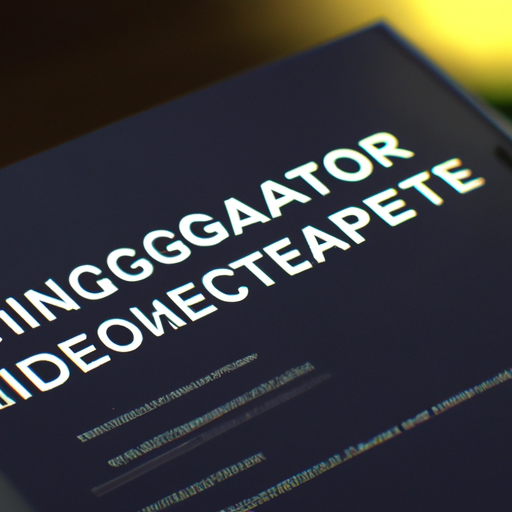-
Table of Contents
- Introduction
- Policy Progressions in the Era of Legal Ledger: A Comprehensive Guide
- Legal Ledger and its Impact on Litigation Landscapes
- Exploring Tech Law Trends in the Age of Legal Ledger
- Navigating Cross-Border Compliance with Legal Ledger
- Understanding IP Rights through the Lens of Legal Ledger
- Q&A
- Conclusion
“Legal Ledger: Your Compass in the Complex World of IP and Compliance”
Introduction
Legal Ledger: Navigating IP and Compliance is a comprehensive guide that provides insights into the complex world of intellectual property (IP) and compliance. It serves as a valuable resource for businesses, legal professionals, and individuals seeking to understand the intricacies of IP laws, regulations, and compliance requirements. The guide explores various aspects of IP including patents, trademarks, copyrights, and trade secrets, and how they intersect with compliance issues. It also offers practical advice on how to navigate these areas effectively to protect business interests and avoid legal complications.
Policy Progressions in the Era of Legal Ledger: A Comprehensive Guide
In the rapidly evolving world of technology, the Legal Ledger has emerged as a critical tool for navigating intellectual property (IP) and compliance issues. As we delve into the Policy Progressions in the era of the Legal Ledger, it is essential to understand the fundamental role it plays in the legal landscape.
The Legal Ledger, often associated with blockchain technology, is a decentralized and immutable record of transactions. It provides a transparent and secure method for recording and verifying transactions, making it an invaluable tool in the realm of IP and compliance. The advent of this technology has necessitated a shift in policy and regulatory frameworks to accommodate its unique characteristics and potential applications.
In the sphere of IP, the Legal Ledger offers a revolutionary approach to managing and protecting intellectual assets. Traditionally, proving ownership of an idea or invention has been a complex and often contentious process. However, the Legal Ledger provides a transparent, immutable record of creation and ownership, making it easier to establish and defend IP Rights. This has significant implications for industries such as music, film, and publishing, where IP disputes are common. The Legal Ledger can provide a clear chain of custody for creative works, reducing the potential for disputes and litigation.
However, the use of Legal Ledger technology also presents new challenges for IP law. For instance, the decentralized nature of the ledger makes it difficult to apply traditional jurisdictional rules. This has led to calls for new international standards and agreements to govern the use of this technology in the context of IP.
In the realm of compliance, the Legal Ledger also offers significant advantages. The transparency and immutability of the ledger make it an effective tool for demonstrating compliance with regulatory requirements. For instance, in industries such as finance and healthcare, where stringent regulations apply, the Legal Ledger can provide a verifiable record of compliance activities. This not only simplifies the compliance process but also provides a robust defense in the event of regulatory scrutiny or litigation.
However, as with IP, the use of the Legal Ledger in compliance also presents new challenges. The transparency of the ledger raises privacy concerns, particularly in sectors where sensitive data is involved. This has led to a need for new policies and regulations to balance the benefits of the Legal Ledger with the need to protect privacy and confidentiality.
In conclusion, the Legal Ledger is reshaping the landscape of IP and compliance, offering new ways to manage and protect intellectual assets and demonstrate regulatory compliance. However, the unique characteristics of this technology also present new challenges, necessitating a shift in policy and regulatory frameworks. As we navigate this new era, it is crucial to strike a balance between leveraging the benefits of the Legal Ledger and addressing the legal and ethical issues it raises. The future of IP and compliance in the era of the Legal Ledger will undoubtedly be a dynamic and evolving journey, requiring ongoing dialogue, innovation, and adaptation.
Legal Ledger and its Impact on Litigation Landscapes
Legal Ledger: Navigating IP and Compliance
In the ever-evolving world of business, the Legal Ledger has become an indispensable tool for navigating the complex landscapes of intellectual property (IP) and compliance. The Legal Ledger, a comprehensive record of a company’s legal transactions, plays a pivotal role in shaping Litigation Landscapes. It provides a clear, concise, and accurate record of all legal activities, thereby ensuring transparency and accountability.
Intellectual property, a key asset for many businesses, is often a contentious issue in litigation. It encompasses everything from patents and trademarks to copyrights and trade secrets. The Legal Ledger serves as a critical tool in managing and protecting these assets. It provides a detailed record of all IP-related transactions, including acquisition, licensing, and enforcement actions. This record can be instrumental in resolving disputes and defending against infringement claims.
Moreover, the Legal Ledger can help businesses navigate the complex world of compliance. Compliance refers to a company’s adherence to laws, regulations, standards, and ethical practices. In today’s globalized business environment, companies must comply with a myriad of rules and regulations, from anti-corruption laws to data protection standards. The Legal Ledger provides a comprehensive record of a company’s compliance efforts, making it easier to demonstrate adherence to these rules and regulations.
The Legal Ledger also plays a crucial role in litigation. It serves as a reliable source of evidence, providing a detailed record of a company’s legal transactions. This can be invaluable in a court of law, where the burden of proof often rests on the party asserting a claim. The Legal Ledger can help businesses substantiate their claims and defend against allegations, thereby influencing the outcome of litigation.
Furthermore, the Legal Ledger can help businesses mitigate risks. By providing a comprehensive record of legal transactions, it allows businesses to identify potential legal issues before they escalate into costly disputes. This proactive approach to risk management can save businesses time, money, and reputational damage.
However, maintaining a Legal Ledger is not without its challenges. It requires meticulous record-keeping and a deep understanding of legal principles. Businesses must ensure that their Legal Ledger is accurate, up-to-date, and compliant with all relevant laws and regulations. This can be a daunting task, particularly for businesses operating in multiple jurisdictions.
Despite these challenges, the benefits of a Legal Ledger far outweigh the costs. It provides a clear and accurate record of a company’s legal transactions, helping businesses navigate the complex landscapes of IP and compliance. It serves as a powerful tool in litigation, helping businesses substantiate their claims and defend against allegations. And it helps businesses mitigate risks, enabling them to identify and address potential legal issues before they escalate into costly disputes.
In conclusion, the Legal Ledger is an indispensable tool in today’s business world. It provides a comprehensive record of a company’s legal transactions, helping businesses navigate the complex landscapes of IP and compliance. It serves as a powerful tool in litigation, helping businesses substantify their claims and defend against allegations. And it helps businesses mitigate risks, enabling them to identify and address potential legal issues before they escalate into costly disputes. As such, businesses should invest in maintaining a robust and accurate Legal Ledger, as it can significantly impact their Litigation Landscapes.
Exploring Tech Law Trends in the Age of Legal Ledger

In the rapidly evolving world of technology, the legal landscape is constantly shifting to accommodate new developments. One of the most significant areas of change is in the realm of intellectual property (IP) and compliance, where the advent of Legal Ledger technology is transforming the way businesses operate. This article will explore the latest trends in tech law, focusing on the challenges and opportunities presented by the rise of Legal Ledger technology.
Legal Ledger technology, also known as blockchain, is a decentralized and secure method of recording transactions. It has the potential to revolutionize many aspects of business, from supply chain management to contract enforcement. However, its implications for IP and compliance are particularly profound.
In the realm of IP, Legal Ledger technology offers a new way to protect and manage intellectual assets. Traditionally, proving ownership of an idea or invention can be a complex and costly process. However, by using a Legal Ledger, businesses can create a permanent, tamper-proof record of their IP. This not only provides robust evidence of ownership but also allows for more efficient management of IP Rights. For instance, smart contracts – self-executing contracts with the terms of the agreement directly written into code – can automate the licensing process, reducing administrative burdens and minimizing the risk of disputes.
However, the use of Legal Ledger technology also presents new challenges. For one, the global nature of blockchain raises jurisdictional issues. If a dispute arises over IP registered on a blockchain, it may be unclear which country’s laws apply. Furthermore, the anonymity provided by blockchain could potentially facilitate IP theft, as it may be difficult to identify and pursue infringers.
In terms of compliance, Legal Ledger technology can both simplify and complicate matters. On the one hand, the transparency and immutability of blockchain make it an excellent tool for demonstrating compliance. Businesses can use it to create an indelible record of their activities, providing auditors with a clear and reliable audit trail. This could be particularly useful in industries with stringent regulatory requirements, such as finance or healthcare.
On the other hand, the use of Legal Ledger technology can also create new compliance obligations. For example, the European Union’s General Data Protection Regulation (GDPR) gives individuals the right to have their personal data erased under certain circumstances. However, this is fundamentally at odds with the immutability of blockchain, creating a potential compliance conundrum.
In conclusion, the rise of Legal Ledger technology presents both opportunities and challenges for businesses in the realm of IP and compliance. To navigate this complex landscape, businesses will need to stay abreast of the latest developments in tech law and seek expert legal advice. As the Legal Ledger continues to evolve, so too will the legal frameworks that govern its use, creating a dynamic and exciting field for legal and tech professionals alike.
Navigating Cross-Border Compliance with Legal Ledger
Legal Ledger: Navigating IP and Compliance
In the rapidly evolving world of international business, the importance of understanding and navigating Cross-Border Compliance cannot be overstated. The Legal Ledger, a comprehensive record of a company’s legal transactions, plays a pivotal role in this process. It is a critical tool for managing Intellectual Property (IP) rights and ensuring compliance with international laws and regulations.
Intellectual Property (IP) rights are a significant asset for any business. They provide a competitive edge in the market and are often the cornerstone of a company’s value. However, managing these rights across different jurisdictions can be a complex task. Different countries have different laws and regulations regarding IP Rights, and failure to comply with these can result in significant legal and financial consequences.
This is where the Legal Ledger comes into play. It provides a detailed record of all IP-related transactions, including patents, trademarks, copyrights, and trade secrets. It tracks the lifecycle of each IP asset, from creation and registration to licensing and enforcement. This comprehensive record allows businesses to effectively manage their IP portfolio and ensure compliance with all relevant laws and regulations.
However, the Legal Ledger is not just about IP Rights. It also plays a crucial role in navigating Cross-Border Compliance. In today’s globalized economy, businesses often operate across multiple jurisdictions. Each of these jurisdictions has its own set of laws and regulations, and businesses must ensure that they comply with all of them. This can be a daunting task, especially for businesses that operate in multiple countries.
The Legal Ledger provides a solution to this challenge. It records all legal transactions, including contracts, agreements, and regulatory filings. It provides a clear and comprehensive overview of a company’s legal obligations in each jurisdiction. This allows businesses to identify potential compliance issues and address them proactively. It also provides a solid foundation for legal due diligence, which is essential in cross-border transactions.
Moreover, the Legal Ledger can also help businesses manage their risk. By providing a detailed record of all legal transactions, it allows businesses to identify patterns and trends. This can help them anticipate potential legal issues and take preventive measures. It can also provide valuable insights for strategic decision-making.
In conclusion, the Legal Ledger is an essential tool for navigating IP Rights and Cross-Border Compliance. It provides a comprehensive record of all legal transactions, allowing businesses to manage their IP portfolio effectively and ensure compliance with international laws and regulations. It also provides a solid foundation for legal due diligence and risk management. In today’s globalized economy, the importance of the Legal Ledger cannot be overstated. It is a critical tool for any business that operates across borders, and its importance will only continue to grow in the future.
Understanding IP Rights through the Lens of Legal Ledger
Legal Ledger: Navigating IP and Compliance
In the complex world of business, intellectual property (IP) rights and compliance are two critical areas that require careful navigation. The Legal Ledger, a comprehensive record of a company’s legal transactions, serves as a valuable tool in this process. Understanding IP Rights through the lens of the Legal Ledger can provide a clearer picture of the intricate landscape of business law.
Intellectual property rights are the legally recognized exclusive rights to creations of the mind. These creations can range from inventions, designs, and brand names to artistic works such as music and literature. The primary purpose of IP Rights is to provide creators with an incentive to develop and share their creations by granting them certain exclusive rights. These rights are typically protected by laws such as patents, copyrights, and trademarks, which enable people to earn recognition or financial benefit from their inventions or creations.
However, the process of obtaining and maintaining these rights can be complex and fraught with potential legal pitfalls. This is where the Legal Ledger comes into play. The Legal Ledger serves as a comprehensive record of all legal transactions related to a company’s IP Rights. It includes details about the acquisition of rights, licensing agreements, disputes, and resolutions. This ledger provides a clear and organized overview of a company’s IP portfolio, making it easier to manage and protect these valuable assets.
Moreover, the Legal Ledger plays a crucial role in ensuring compliance. Compliance refers to the process of ensuring that a company adheres to all applicable laws, regulations, and standards. In the context of IP Rights, compliance involves ensuring that a company’s use of its IP assets does not infringe upon the rights of others and that it complies with all relevant IP laws and regulations. The Legal Ledger provides a detailed record of all IP-related transactions, making it easier to monitor and ensure compliance.
For instance, if a company licenses its patented technology to another company, the Legal Ledger would record the details of this transaction. This would include the terms of the license, the parties involved, and any relevant dates. If a dispute were to arise regarding this license, the Legal Ledger would provide a clear record of the transaction, making it easier to resolve the dispute. Similarly, if a company were to be audited for compliance with IP laws, the Legal Ledger would provide a comprehensive record of the company’s IP transactions, making it easier to demonstrate compliance.
In conclusion, the Legal Ledger serves as a valuable tool in navigating the complex landscape of IP Rights and compliance. It provides a clear and organized record of a company’s IP transactions, making it easier to manage and protect these assets. Moreover, it plays a crucial role in ensuring compliance with IP laws and regulations. By understanding IP Rights through the lens of the Legal Ledger, businesses can better navigate the intricate world of business law, protect their valuable creations, and ensure their continued success.
Q&A
1. Question: What is a Legal Ledger?
Answer: A Legal Ledger is a system or tool used to record and track legal transactions, contracts, and intellectual property rights. It ensures transparency, security, and compliance with legal regulations.
2. Question: How does Legal Ledger help in navigating IP?
Answer: Legal Ledger helps in navigating IP by providing a clear record of intellectual property rights, including patents, trademarks, and copyrights. It can track the creation, transfer, licensing, and sale of IP Rights, ensuring that all transactions are legal and transparent.
3. Question: What is the role of Legal Ledger in compliance?
Answer: Legal Ledger plays a crucial role in compliance by ensuring that all transactions and contracts are recorded and can be audited. It helps organizations to comply with legal regulations and standards, reducing the risk of legal disputes and penalties.
4. Question: Can Legal Ledger be used in any industry?
Answer: Yes, Legal Ledger can be used in any industry that requires the tracking and recording of legal transactions and contracts. This includes industries like technology, finance, healthcare, entertainment, and more.
5. Question: What are the benefits of using a Legal Ledger?
Answer: The benefits of using a Legal Ledger include improved transparency, security, and efficiency in managing legal transactions and contracts. It also helps in ensuring compliance with legal regulations, reducing the risk of legal disputes, and protecting intellectual property rights.
Conclusion
Legal Ledger: Navigating IP and Compliance is a crucial tool for businesses and individuals to understand and manage intellectual property rights and compliance issues. It provides a comprehensive guide to navigate through complex legal landscapes, ensuring that businesses operate within the law, avoid potential legal disputes, and protect their intellectual property. It emphasizes the importance of understanding and adhering to compliance regulations to maintain business integrity and avoid costly penalties.



